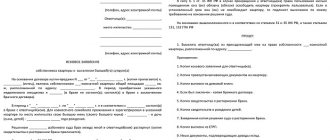Home / Real estate / Acquisition of real estate / Privatization
Back
Published: 01/28/2018
Reading time: 7 min
0
69
Municipal housing is currently represented by several types: apartments transferred under a social tenancy agreement for the use of one person or family, communal apartments, as well as dormitories that belong not only to the municipality or the state, but also to various enterprises, including state
- What kind of housing can be privatized?
- Partial privatization or privatization of a share in a municipal apartment Preparation of documents
- Stages of privatization
Provision of housing under a social tenancy agreement
Municipal authorities provide housing free of charge.
- The social tenancy agreement directly states that the tenant’s responsibilities include timely payment of utilities.
- An apartment or house used under a social contract. rental, cannot be sold, exchanged or gifted.
- Even redevelopment cannot be done without the consent of municipal authorities.
- The tenant has the opportunity to privatize the provided apartment under the “free privatization” program.
What is the purpose of housing privatization?
This procedure is necessary, especially if there are children and grandchildren. They can inherit a privatized apartment. And this process requires your own real estate.
Non-privatized housing cannot be inherited. If the tenant dies, the state will own the living space, and local authorities will determine who will use it in the future.
If the tenant registers a stranger in his living space, then when he dies, the registered tenant will own the apartment.
Having decided to privatize, you need to know that utility bills will increase. You will have to pay for a garbage disposal, an elevator, and repair work at the entrance.
Having an unstable low income, you should also not engage in privatization in order not to incur more expenses in the form of property taxes.
In general, everyone needs to privatize real estate so as not to be left completely without living space. In addition, this is a great chance to become the owner of your own personal home.
Legal regulation
The legislative basis for the privatization of an apartment is:
- Civil Code of the Russian Federation.
- Housing Code of the Russian Federation.
- Law No. 1541-1 of July 4, 1991 “on the privatization of housing assets.”
Where to go
To privatize, you will need to visit several authorities.
- The BTI will need to request technical documents and check whether the actual condition of the apartment corresponds to the plan displayed in the technical documents. documents
- In order for privatization to be implemented, it will be necessary to collect a certain package of documents, for example, papers confirming the absence of debts on utility bills and information on registration in the premises will be necessary. Such documents must be requested from the Housing Office or through the MFC.
- It must be remembered that for privatization it will be necessary to determine who will claim shares of the object. If one of the registered persons does not want to participate in privatization and claim square meters, then they need to write a refusal and have it certified by a notary.
- After collecting documents, you must contact the housing department of the municipality with a statement of desire to privatize the apartment.
By agreement of the parties
How to privatize a room in a municipal apartment? If it is not possible to allocate a room along with part of the bathroom and kitchen, the division can be carried out by agreement of the parties .
In this case, those registered in the apartment draw up an agreement on the right to use the residential premises, which determines which specific room belongs to each resident.
The agreement specifies the following information:
- Parties to the contract. Personal and passport data, information about the date of registration in the apartment.
- Address and characteristics of the premises.
- Distribution of rooms between residents, indicating their area.
The document is signed by the parties and certified by a notary.
Thus, the apartment becomes communal with isolated living spaces and common areas.
How is part of a municipal apartment privatized without the consent of the residents?
What is it for?
Privatization is the transfer of real estate from the status of municipal property to private property.
Owning an apartment by right of ownership allows you to dispose of it at your own discretion, i.e. After the privatization process, the apartment can be sold, donated or rented.
What law regulates the privatization of a communal apartment? Where to go to privatize an apartment? Find out here.
After privatization, the owner is a certain person or persons who own parts of the apartment. Other persons who register in the area of the object after the completion of privatization do not lay claim to parts of the apartment.
Is it worth registering as a property?
Privatizing real estate is quite profitable because:
- Privatization of apartments is free, i.e. the municipality does not require payment of the cost of the apartment to transfer rights to a civilian.
- After re-registration, the owner has the right to dispose of the property at his own discretion.
- The presence of property in a citizen gives him the opportunity to provide it as collateral to credit institutions.
- Privatized real estate can be passed on by inheritance.
Alternative options for share privatization
It must be taken into account that it will be impossible to directly privatize a share in an apartment through the court, since when considering a claim, the restriction on the transfer of ownership of part of the property will be taken into account. However, the same rule can be used in another way - if the law provides for the privatization of only an entire property, you can demand the division of a municipal apartment into two independent real estate.
This course of action will be practically impossible if citizens own a one-room apartment that is not subject to division in kind. In this case, even an exchange for other municipal housing will be difficult, since exchange transactions for non-privatized apartments do not provide for the possibility of making an additional payment.
The division of municipal housing into independent real estate objects can be carried out in the following ways:
- applying to the municipal authority with an application to exchange the apartment into two independent objects by dividing personal accounts and concluding independent social tenancy agreements,
- exchange of an apartment for two independent living quarters, while separate social tenancy agreements are also drawn up for the new housing.
The implementation of these options is also difficult, since it depends on the discretion of the municipal authority, as well as on the availability of the municipal fund for exchange.
The possibility of dividing personal accounts was provided for in the Housing Code of the RSFSR, however, with the adoption of the Housing Code of the Russian Federation, this method of solving the housing problem is significantly limited. If citizens live in an apartment under separate rental agreements, they will be able to privatize their part of the living space without any problems. If personal accounts are not separated, it is possible to bring this dispute to the courts.
Advantages and disadvantages
There are many benefits from going through the housing privatization process:
- The citizen previously living in the apartment, as a tenant, becomes the full owner and has the right to dispose of the property at his own discretion.
- After the death of the owner, the property is inherited. Non-privatized real estate, in the event of the death of the tenant, is returned to the municipal fund.
- The procedure for obtaining permission for redevelopment has been simplified for owners. If you are planning major renovations on public property, you will need to request permission for renovations from the municipal authorities to obtain permission.
- In the event of loss of real estate due to an emergency, the authorities are obliged to provide housing that is no worse in conditions and no cheaper than the previous premises. If non-privatized real estate was destroyed during an emergency, then the state is obliged to provide living space with an area sufficient for all people registered in the lost property. The resulting housing may be smaller than the previous one, and worse in terms of conditions.
The disadvantages are that:
- After privatization, the responsibility to pay taxes passes to the owner.
- Also, the amount of utility bills increases, because... you will need to pay on cap. repair.
Price
Privatization itself is free, but paperwork will take a lot of time and a certain amount of money.
You can calculate the approximate amount of payment for processing certain types of documents:
- technical passport and floor plan – 1500 rubles;
- cadastral passport – 200 rubles;
- a certificate confirming that the person has not previously used the right to carry out privatization - 500 rubles.
You can reduce the registration time by contacting legal agencies. Despite the fact that time will be saved, the services of lawyers are provided on a paid basis. The cost of privatizing part of the apartment will increase significantly.
For performing the manipulation, citizens of the Russian Federation living in the apartment will need to pay a state fee in the amount of 1000 rubles per person.
How to privatize a municipal apartment
The privatization process has its own characteristics.
In order to privatize real estate, the first step is to obtain the consent of all people living in the area of the property.
If someone does not want to participate in privatization, he must write an official refusal of the share in the apartment and have it notarized.
It should be remembered that you can use the right to privatization only once.
Part
It is not prohibited to privatize part of an apartment if this apartment is a communal property.
If part of the premises is re-registered by a married couple, then the room becomes their jointly acquired property. After such privatization, partial leasing is completely legal, i.e. the privatized part of the apartment is transferred to the tenants for use.
room
Privatization of one of the rooms in the apartment is feasible only if the remaining persons registered in the apartment have written a refusal of this premises.
After the privatization of the room, the owner has the right to use common areas according to the rules established between the residents.
Share
The share of real estate is determined by square meters. Those. If many people live in a communal apartment, then each of them has the right to a certain share, i.e. quadrature - it can be 10 meters squared or 5 or 3.5.
After what time can you
The law does not define temporary standards for living in a privatization facility.
A tenant can be registered in an apartment for twenty years and have the right to receive ownership of the property, or he can register and begin the re-registration process in the same month.
Without agreement
When privatizing, it is necessary to enlist the support of all persons registered on the property.
If someone is against it, then he must write a refusal to participate in privatization or check out of the apartment.
If someone deliberately interferes with privatization, then re-registration is possible through the court.
A nuance of the privatization process is that if there are minor children in the apartment, it is necessary to obtain consent from the guardianship and trusteeship authorities.
If one is against
A negative attitude towards the privatization of the apartment of one of the citizens registered in its area should be documented by writing a refusal to participate in privatization.
The waiver becomes effective only if it is notarized.
If it's official
If the apartment is used by employees of any non-state structure, then it will not be possible to privatize it.
There are a number of exceptions to this rule:
- Privatization is possible if the owner of the property gives his approval, i.e. organization.
- If the housing stock is owned by the municipality after its voluntary transfer from the company. Those. employees first lived in apartments owned by the company, and then in municipal apartments, and thus had the opportunity to privatize their living space.
- If the property was previously owned by a state organization, but then the company changed its status and became a private, commercial office. The real estate remaining on the balance sheet of the reorganized structure can be re-registered as the property of a private person.
What does the law say?
Dear readers! The article talks about typical ways to resolve legal issues, but each case is individual. If you want to find out how to solve your particular problem , contact a consultant:
+7 (Saint Petersburg)
APPLICATIONS AND CALLS ARE ACCEPTED 24/7 and 7 days a week.
It's fast and FREE !
When deciding whether it is possible to privatize part of an apartment, one should be guided by the provisions of the Federal Law of July 4, 1991 “On the privatization of the housing stock of the Russian Federation.”
Article 2 of the Law indicates that citizens living in housing under a social tenancy agreement have the right to purchase housing as common property or as the property of one person, including a minor.
The decision to privatize must be unanimous. One or more persons have the right to refuse to participate in the transaction (but must agree to privatization) in favor of the future owners.
Residents who refuse have the right to permanent residence in a privatized apartment.
Procedure
A privatization deal can only be concluded if certain steps are completed in the required sequence:
- You will need to collect a portfolio of papers required for privatization. When collecting documentation, you need to understand that documents have different validity periods and terms of their preparation, for example, it is better to order a certificate of family composition at the last moment, because it is valid for only ten days, and documents from the BTI must be ordered in advance, because their preparation can take a whole month.
- Contacting the municipal housing authority to write an application and submit documents.
- After reviewing the submitted documents, the municipality makes a decision on the possibility of privatization. The authorities prepare an agreement on the transfer of ownership rights within two weeks.
- After the contract is concluded, you must contact the registration chamber and order title documents for the property.
Drawing up a separate rental agreement
Is it possible to privatize a share in a municipal apartment without the consent of the other residents? If it is not possible to reach an agreement with the residents of the apartment peacefully, the privatization of a share in a municipal apartment can only be carried out by drawing up a separate lease agreement .
In this case, the last word remains with the owner of the premises, that is, local authorities.
A citizen needs to contact the settlement administration with a request to conclude new social tenancy agreements for the occupied living space.
It is quite difficult to achieve a positive decision from the authorities in this case, since turning the apartment into a communal apartment is not profitable for the authorities.
But if there are compelling arguments and a loyal attitude from local governments, this option is still possible .
If the authorities meet citizens halfway and conclude several rental agreements with residents of a municipal apartment, each of them will become the owner of a room and will be able to acquire ownership rights to it.
If the authorities refuse to carry out the procedure, you can try to resolve the issue through the court . A citizen files a claim for the renegotiation of social tenancy agreements.
What documents are needed
To submit an application to the residential department of a city or other locality will need to collect a very specific package of documentation.
The list of documents includes:
- Application for privatization. As a rule, it is written already in veins. department when you have all the other papers on hand.
- An extract from the unified real estate register (now this is the document that is issued to apartment owners, instead of the usual pink certificate).
- Technical passport of the object.
- Proof that none of the privatization participants have used their rights before. The proof is a certificate that can be requested from Rosreestr.
- Information about registered and discharged persons for the entire period of use of the apartment. Such an extract is issued at the local passport office.
- Extract from persons. apartment account, from which it follows that there are no debts on utility bills.
- A social tenancy agreement, on the basis of which people live in the apartment.
- Passports of all citizens registered on the real estate area.
- Notarized refusals of those persons who are registered in the apartment, but do not claim part of it after privatization.
- Documents from the guardianship and trusteeship authorities on consent to privatization without the participation of a minor child registered in a non-privatized property.
- A receipt confirming payment of the state fee.
Principles of privatization transactions
To determine the possibility of re-registering rights to a share in a municipal apartment, it is necessary to analyze the basic principles of the privatization program. Law of the Russian Federation No. 1514-1 regulates that in order to participate in the privatization program, the following conditions must be met:
- citizens living in a municipal apartment have a social tenancy agreement,
- decision-making by all tenants living in the residential premises (it is possible to issue a notarized refusal in favor of other persons, however, in this case, all residents confirm their will),
- An entire property is subject to privatization; registration of rights to part of an apartment through privatization is not allowed.
Thus, the legislation significantly limits the possibility of participation in privatization if at least one of the residents objects to this procedure or avoids making a decision. Moreover, the law does not allow coercion to participate in a privatization transaction. Even going to court with such a demand will not bring results, since the applicant will be denied the claim.
How can you register ownership of part of a residential premises?
Such issues often arise between family members who have hostile relationships, which prevents them from making joint decisions about the fate of the property.
The simplest solution to the problem is to reach a general agreement among all residents on the privatization of residential premises into common shared ownership. When submitting an application to the municipal body, citizens have the right to choose for themselves what form of ownership will be established in the content of the privatization agreement. If a joint form of ownership is advisable in the presence of family relationships, then in case of possible problems between residents it is better to register shared ownership.
Naturally, this option requires the consent of all adult citizens who have the right to permanent residence in the apartment. In the absence of consent, privatization in this form will be impossible.
Let's consider what other ways exist to circumvent the legislative ban on the privatization of part of a residential premises.
Questions and answers
During the privatization process, many questions arise that can be asked of lawyers.
The article presents the most popular questions and what answers the law provides.
Who is eligible
Absolutely every citizen of the Russian Federation who is registered on a residential area of municipal real estate has the right to privatization.
Anyone who has not privatized anything before can privatize.
There are exceptions to this rule, for example, if a child participated in privatization, then after he reaches the age of eighteen, it becomes possible to undergo privatization again.
Children can participate in privatization only with the consent of their parents and guardianship authorities.
Can they refuse?
Privatization can be refused only if:
- An incomplete package of documents was provided.
- The validity of the documents, at the time of their delivery to the authorities, had already expired.
- It is impossible to obtain ownership of the object, since it is not included in those permitted for privatization.
- Some of the persons who have expressed a desire to participate in privatization do not have the right to do so.
Is it possible to sell without registering ownership?
A lot of people throughout Russia ask about how to sell municipal real estate.
Is privatization of emergency housing allowed? Is it possible to take part in privatization a second time? Find out here.
Read about the privatization of apartments in closed military camps at the link.
The answer is simple and clear - it will not be possible to sell non-privatized real estate, because... the owner is the state.
Without the consent of the person registered in it
Privatization of a municipal apartment is possible, even if one of the registered persons opposes re-registration.
There are several ways out of this situation:
- Ask the dissatisfied person to refuse to participate in privatization.
- Discharge the rebel from the apartment.
- Apply through the court.
How to register property after the child is discharged
If children are registered at the property, then to simplify the privatization process, children can be registered at a different address.
If there are no minors left at the facility, then there will be no need to visit the guardianship and trusteeship authorities.
In the video about the privatization of an apartment
That's why FREE expert consultants work for you around the clock!
- via the form (below), or via online chat
- Call the hotline:
- Moscow and the Region
- St. Petersburg and region
- Regions
APPLICATIONS AND CALLS ARE ACCEPTED 24/7 and 7 days a week.
Child's share
If one of the residents is a minor child, his share will also need to be taken into account. Up to the age of 14, her fate is determined by her parents, and after 14, the child decides for himself whether to participate in privatization or not.
Regardless of age, permission from the guardianship authorities is still required. It should be noted that privatization is in the interests of the child, so obtaining this consent is not difficult.
The share of a person who does not actually live in a municipal apartment
If part of the apartment is in the use of a person who does not actually live here and does not pay for services, then consent to privatization will still be required from him. If such a person does not agree to register ownership of the home, you can try to forcibly evict him through the court. To do this, you need to prove that the person has other housing, does not actually live in a municipal apartment and does not pay for services. If a positive court decision is received, then consent from the person is no longer required; it can be replaced by that same decision.
Apartment section
Another option for partial privatization is to divide the apartment into several separate rooms, thereby turning it into a communal one. In such a situation, it is possible to privatize only individual rooms/rooms, maintaining the status of the remaining premises. However, the municipality is extremely reluctant to take such measures, so you shouldn’t count on them.
Housing exchange
And the last option is to exchange one large home for 2 smaller ones. All persons who do not want to privatize an apartment will move to one, and those who do want to will move to the other. Formally, this is possible, but in practice, suitable vacant premises can be waited for decades.










